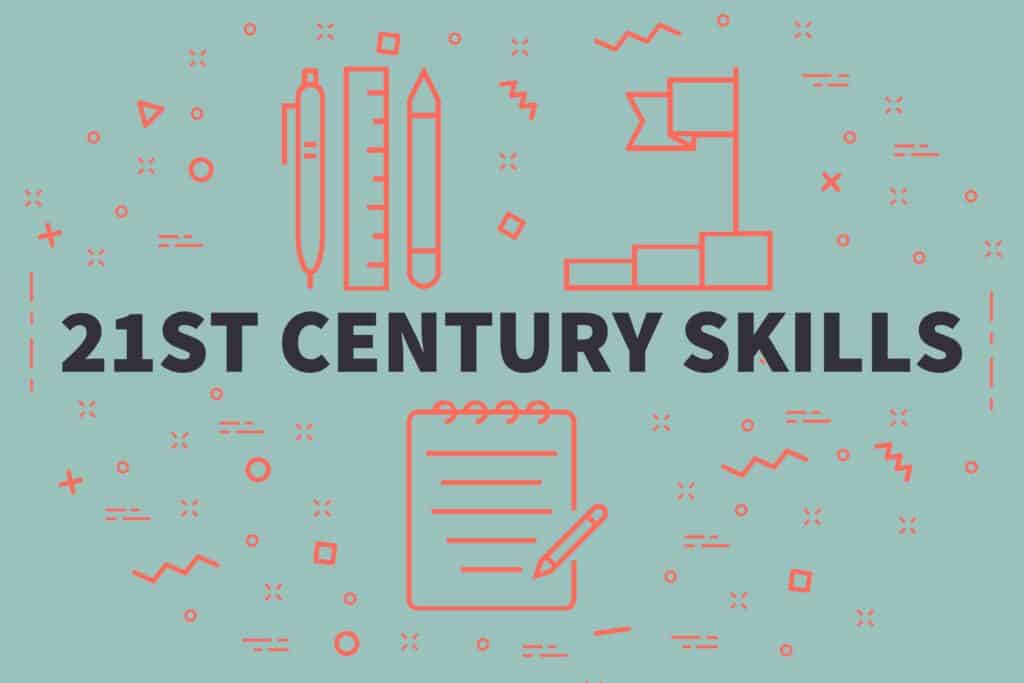The world our students will inherit is changing fast, driven by technology and global connections. As experienced teachers, we understand that the traditional focus on rote memorization and content recall is no longer enough. Our mission needs to evolve urgently to prepare our students for the future.
We must equip them with 21st Century Skills, which are essential competencies outlined by organizations like P21 (Partnership for 21st Century Learning) that are vital for success in an increasingly complex world. These skills are not new subjects; they form the foundation for success in all fields and careers.
The “Four Cs”: A Foundation for Success You Must Teach
While the full list of 21st-century skills is long, the “Four Cs” are a crucial foundation that should be included in every lesson plan, no matter the subject.
- Critical Thinking and Problem-Solving
The vast amount of information and complex challenges today requires strong discernment. Critical thinking involves analyzing, evaluating, and synthesizing information and arguments logically and objectively instead of just accepting them as they are.
Go beyond simple recall questions. Create authentic, complex problems that ask students to evaluate multiple sources, recognize biases, solve new problems through inquiry, and build well-reasoned arguments. Use Socratic Seminars to encourage deep discussions and challenge assumptions.
- Communication
In a world that connects us instantly, clear, effective, and empathetic communication is essential. We must teach students to master not just writing and speaking skills but also non-verbal cues and digital literacy.
Provide diverse opportunities for students to express ideas. Shift from traditional essays to presentations with visuals, collaborative documents, professional email writing, and even short instructional videos. Focus on active listening and articulating complex ideas clearly.
- Collaboration
Most real-world problems are solved through teamwork, from scientific research to business strategies. Collaboration is the ability to work effectively with diverse teams, manage conflicts, share responsibilities, and contribute equally to a common goal.
Create group projects with defined roles for each team member (e.g., project manager, researcher, designer). Use Project-Based Learning (PBL) where the final result requires combining different skills and ideas. Teach students strategies for giving and receiving constructive feedback.
- Creativity and Innovation
Automation can handle routine tasks, making human creativity focused on new solutions a valuable asset. Creativity is about generating new ideas, while Innovation is about putting them into action meaningfully.
Offer open-ended tasks and “maker time” where experimentation and learning from failures are encouraged and celebrated. Promote “design thinking,” a method that emphasizes empathy, iterative brainstorming, prototyping, and testing.
Beyond the Cs: Essential Digital & Global Literacy Skills
We must prioritize skills that help students navigate today’s information and technology landscape with ethical awareness.
- Information Literacy & Source Vetting
This is the ability to find, evaluate, use, and cite information ethically. With the rise of disinformation, this skill is critical for academic honesty and active citizenship.
Teach students to use the CRAAP Test (Currency, Relevance, Authority, Accuracy, Purpose) or similar methods, not just theoretically but as a necessary step, to assess the reliability and bias of all digital and print sources.
- Media Literacy and Consumption
Students are constantly exposed to media, from ads to social feeds. Media literacy helps them understand how media messages are made and the purposes behind them, as well as how those messages affect perceptions and behavior.
Analyze the techniques used in various media forms, from documentaries to social media, to uncover their true intent.
- Technology Literacy & Digital Citizenship
This involves using technology responsibly and effectively, understanding how these tools work, and adapting to new platforms quickly. It should emphasize security and privacy.
Integrate digital tools for research, creation, and communication. This involves understanding how personal and collective data is used, the legal aspects of sharing work, and the principles of respectful digital citizenship.
Making the Shift
Integrating these skills isn’t about adding content; it’s about changing our teaching methods, the evidence-based ways we teach and structure student tasks.
Be Explicitly Intentional: Clearly state and define the 21st-century skill you are focusing on in a lesson. For instance, say, “Today, we are working on our collaboration skills by practicing active listening and negotiating terms for a fictional treaty.” This makes the skill an assessed learning goal.
Model Authentic Behavior: As role models, we need to show effective critical thinking, communication, and digital etiquette. Demonstrate your process when evaluating a source or solving a complex issue.
Assess Holistically and Transparently: Evaluate not only the final product but also the collaboration process, the quality of communication, and the depth of critical thinking demonstrated. Use clear rubrics to define success criteria for each targeted 21st-century skill.
By embracing these essential skills and adjusting our approach, we’re not just teaching a curriculum; we’re empowering future learners to become adaptable, ethical, and innovative citizens ready for the challenges ahead.
You’ve got important career goals — we have the graduate program to get you there. Check out our available graduate degree programs to advance your career today!




